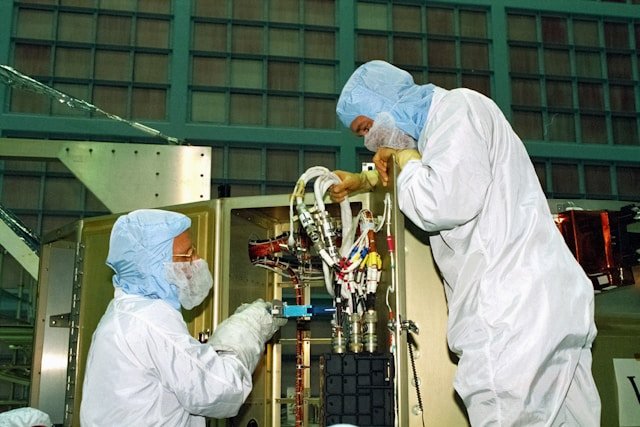Mind-Blowing Facts About Biomedical Equipment Technology You Wish You Knew Earlier
So, What Exactly Is Biomedical Equipment Technology?
Most people think biomedical equipment technology is all about fixing machines in hospitals—and that’s it. Nope, not even close. It’s way bigger than just “repairing stuff.” This field blends healthcare, engineering, and technology in a way that helps save lives every single day.
So, let’s break it down in plain English. Biomedical equipment technology is all about the design, use, and maintenance of medical devices that doctors and nurses use to treat patients. We’re talking about machines like ECG monitors, defibrillators, X-ray systems, infusion pumps, and even ventilators. These are not just fancy tools—they’re life-saving tech that keeps hospitals running.
What makes this field super cool is that it’s not just about the gadgets. It’s about making sure those gadgets are working perfectly when lives are on the line. Whether it’s a patient monitoring system in the ICU or a CT scanner in radiology, these devices need to be reliable, accurate, and safe. That’s where biomedical equipment tech comes into play.
And here’s a fun fact—this isn’t some far-off futuristic field. It’s happening right now, in hospitals near you, quietly making healthcare smarter and more efficient. That’s why the demand for biomedical technicians and healthcare technology specialists is growing, both in developed and developing countries.
Why Is Biomedical Equipment So Important in Healthcare?
Some folks still believe that doctors and nurses are the only heroes in healthcare. While they deserve the spotlight, there’s a whole world of medical equipment behind them that often goes unnoticed, but it’s just as important.
Imagine this: a patient gets rushed into the ER. Without anesthesia machines, defibrillators, or oxygen monitors, how can the team save that person? That’s where biomedical equipment steps in and does the heavy lifting.
Biomedical equipment technology in healthcare is crucial because it helps doctors diagnose, monitor, and treat patients accurately and efficiently. Devices like MRI machines, ventilators, and ultrasound systems provide real-time data that helps medical staff make life-saving decisions on the spot.
Here’s another way to look at it—these machines are the “eyes and ears” of doctors. For example:
- Diagnostic devices like ECGs or CT scanners detect issues that aren’t visible to the naked eye.
- Therapeutic equipment like infusion pumps ensures the right dose of medication is delivered at the right time.
- Medical imaging equipment allows healthcare providers to peek inside the body without surgery.
Now, think about how vital it is that all these tools work perfectly. Even the tiniest malfunction can affect a patient’s outcome. That’s why biomedical equipment maintenance is a big deal—it keeps everything running smoothly, from emergency rooms to operating theaters.
In short, biomedical equipment isn’t just “hospital gear”—it’s the backbone of modern healthcare. It improves patient safety, speeds up recovery times, and helps doctors do their job better. And the best part? With ongoing advances in health tech and smart hospital systems, it’s only getting better from here.
Common Types of Biomedical Equipment You See Every Day (But Don’t Notice)
Let’s bust a myth right away—biomedical equipment isn’t just the high-end machines you see in medical dramas. It’s not all about robotic arms or super complex lab tech. In reality, a lot of biomedical devices are around us all the time, especially if you’ve ever stepped foot in a hospital or clinic. You just don’t notice them because they blend into the background.
So, let’s shine a light on the stars of the show—the most common types of biomedical equipment that quietly save lives every day:
➤ Diagnostic Devices
These are the tools that help doctors figure out what’s going on inside your body, without even cutting you open. Sounds like magic, right? But it’s just solid biomedical technology at work.
- ECG machines monitor your heart’s rhythm.
- CT scanners and MRI machines create detailed images of your organs.
- X-ray systems reveal fractures, infections, or internal issues.
They help catch problems early, which can make a massive difference in treatment.
➤ Therapeutic Equipment
Now we’re talking about the machines that do the actual treatment part. This is the gear that keeps patients stable or helps them heal faster.
- Infusion pumps control the flow of medication or fluids into the body with pinpoint accuracy.
- Dialysis machines filter toxins from the blood for patients with kidney problems.
- Ventilators help people breathe when their lungs can’t keep up on their own.
These devices are vital, especially in intensive care or emergency rooms.
➤ Surgical and Monitoring Tools
Surgeries today are safer and more precise, thanks to tech like:
- Electrosurgical units that cut tissue or stop bleeding.
- Patient monitoring systems that track heart rate, oxygen levels, and other vitals during and after surgery.
This category includes wearable monitoring devices, too, like pulse oximeters that clip onto your finger. Small, but powerful.
➤ Medical Imaging Equipment
Let’s not forget devices like ultrasound machines, which are used everywhere from pregnancy checkups to heart disease diagnosis. These tools help doctors “see” things they couldn’t otherwise see—and that’s a big deal.
So yeah, biomedical equipment isn’t just for specialists or techies. It’s all around us, working quietly in the background, keeping people safe and helping doctors make smarter decisions.
Behind the Scenes: How Does Biomedical Equipment Work in Hospitals?
Most people think medical machines just work like magic—press a button, and poof! A diagnosis appears. But in reality, there’s a whole science behind how biomedical equipment works in hospitals. And trust me, it’s more interesting than you think.
Let’s break it down in simple terms.
➤ It’s All About Connection and Communication
Many hospital devices don’t just sit there alone—they talk to each other through a hospital’s internal network. For example:
- A patient monitor might be connected to a central system so that nurses can track multiple patients from one screen.
- Smart infusion pumps can alert staff if medication levels are off.
- Digital imaging devices send results straight to the doctor’s computer—no need for physical film anymore.
This is what we call smart hospital technology—and it’s powered by biomedical equipment systems working in sync.
➤ Sensors, Software, and Safety
Here’s where it gets technical (but not too techy, don’t worry).
- Most devices rely on sensors to collect data—heart rate, oxygen levels, blood pressure, etc.
- That data is then processed using built-in software that interprets it and gives doctors the information they need.
- And behind all this? Safety checks, alerts, and backup systems are used to make sure everything runs smoothly and safely.
If a device starts acting weird, it might trigger an alarm or shut itself down to avoid risks. That’s biomedical safety protocol in action.
➤ Maintenance Makes It Happen
Here’s something hospitals don’t advertise, but it’s super important: these machines need constant care. And that’s where biomedical technicians come in.
- They calibrate the machines regularly so the results are accurate.
- They repair or replace parts when needed.
- They also troubleshoot issues on the spot, especially in emergencies.
Biomedical equipment doesn’t just work—it’s made to work, monitored constantly, and maintained like a high-performance engine. Without this level of behind-the-scenes care, hospitals wouldn’t be able to function as smoothly as they do today.
No, Biomedical Equipment Technicians Don’t Just “Fix Stuff”
Let’s kill this common belief right away: biomedical equipment technicians are not just “repair guys.” That label seriously undersells what they do. These professionals are more like the guardians of hospital technology—without them, medical devices wouldn’t work properly, and patient care would fall apart.
So, what do they do? A lot.
➤ They Install and Calibrate Medical Devices
When new equipment arrives at a hospital—whether it’s an ECG monitor or a ventilator—it’s not ready to use out of the box. Biomedical techs are the ones who install it, test it, and calibrate it so that it works like it should.
They don’t just follow a manual. They need to understand the engineering and electronic components behind the machine to make sure it’s giving accurate readings.
➤ They Perform Preventive Maintenance
This is where they shine. Biomedical equipment doesn’t wait until it breaks to throw a tantrum. It needs regular checkups—kind of like your car.
Technicians follow a preventive maintenance schedule, checking sensors, wiring, batteries, software updates—you name it. This helps avoid sudden failures and keeps patients safe. Many hospitals rely on hospital equipment maintenance logs to track this work, and it’s all handled by these techs.
➤ They Troubleshoot and Repair Under Pressure
When something goes wrong during surgery or in the ICU, doctors panic. But biomedical equipment technologists jump in fast. They know how to diagnose errors, replace faulty parts, and get the system back online—sometimes in minutes.
That’s not just technical skill—it’s real-time problem solving in high-pressure situations.
➤ They Stay Updated with Technology
Medical devices are always evolving. New models come out with smart features, AI-based diagnostics, and more complex software. Biomedical techs constantly learn and adapt to keep up with modern healthcare technology trends.
In short, they’re not just fixing things—they’re making sure medical devices are safe, accurate, and ready when lives are at stake. That’s way more than being a “repair guy,” right?
Career Scope: Is Biomedical Equipment Technology a Good Career Path?
Some people think there’s no future in biomedical equipment tech—that it’s a dead-end job or just a backup plan. That couldn’t be further from the truth. This field is booming, and it’s one of the most in-demand career paths in healthcare tech right now.
Here’s why you might want to seriously consider it.
➤ Massive Demand Across Healthcare Facilities
Hospitals, diagnostic centers, surgical clinics—even remote telehealth setups—need biomedical technologists to keep things running. And it’s not just local demand.
With global healthcare expansion, countries all over the world are hiring certified biomedical technicians. From small towns to major cities, job openings in biomedical equipment support are growing fast.
➤ Solid Earning Potential
Let’s talk money. Entry-level biomedical equipment techs make decent salaries, and it only goes up with experience, certifications, and specialization. Some techs move into equipment consulting, field service roles, or even biomedical engineering with advanced education.
And since this role is critical in hospitals, it often comes with job security, benefits, and opportunities for promotion.
➤ Great for Tech-Savvy People Who Love Helping Others
If you’re someone who likes gadgets and wants to make a difference in healthcare, this is a dream combo. You’re not stuck behind a desk all day—you’re solving real problems, helping real patients, and working with cutting-edge medical tech.
Plus, as hospitals shift toward digital health systems, the demand for professionals who understand both tech and healthcare is skyrocketing.
➤ Plenty of Growth Paths
Biomedical equipment technicians can grow into:
- Senior biomedical engineers
- Clinical equipment managers
- Medical device trainers
- Or even start their own biomedical services business
There’s also room for specialization. Want to focus only on imaging systems? Or maybe dive into telemedicine equipment or wearable medical devices? You’ve got options.
So yeah, this career path isn’t just “good”—it’s smart, future-proof, and full of opportunity for the right people.
No, You Don’t Need to Be a Doctor to Work with Medical Technology
One of the biggest myths about this field is that you need to be a doctor or have some fancy medical degree to get into biomedical equipment technology. That’s wrong.
You don’t need to know how to treat patients—you just need to know how to help the doctors do their job better. And that happens when the machines they rely on are working perfectly. That’s where you come in.
➤ What You Need
To become a biomedical equipment technician, you usually need a diploma or degree in biomedical technology, electronics, or a related field. You’ll study stuff like:
- Electronics and microprocessors
- Biomedical instruments
- Anatomy and physiology (basic level)
- Troubleshooting and safety standards
The goal? Understand how machines interact with the human body—and how to keep them running safely.
➤ Certifications Give You a Boost
If you want to grow faster in this career, certifications can help. In the U.S., for example, people go for the CBET (Certified Biomedical Equipment Technician) exam. Some also take courses in healthcare equipment servicing, medical equipment calibration, or ISO compliance training.
It’s not about memorizing medical terms—it’s about understanding how equipment like infusion pumps or ECGs work and how to maintain them according to global standards.
➤ Hands-On Skills Matter Most
Bookish knowledge can only take you so far. What counts is your ability to work hands-on with machines, understand circuits, interpret error codes, and act fast.
Most employers prefer candidates who’ve done internships or practical lab work. So, if you’re wondering how to enter biomedical equipment technology without being a doctor, just focus on technical education and real-world experience.
You’ll be working with the healthcare team, not trying to become one of them.
Future Trends in Biomedical Equipment Technology
Another common misunderstanding is that this field is “basic” and not evolving. But the reality? Biomedical equipment technology is advancing fast, and it’s heading straight into the future of smart healthcare.
Let’s talk about what’s coming next.
➤ Smart Devices with AI and IoT
Medical equipment is getting smarter. Devices now come with:
- Real-time monitoring
- Remote diagnostics
- AI-powered analytics
This means a technician’s job is no longer just hardware-focused. You’ll need to understand how data flows, how to secure that data, and how to work with connected healthcare devices.
Whether it’s a smart ventilator, cloud-based patient monitor, or an IoT-integrated infusion pump, biomedical technologists will be key in setting these up and maintaining them.
➤ Telemedicine is Booming
More hospitals are offering remote care, and that requires a ton of backend support. Biomedical techs help install and maintain:
- Portable diagnostic equipment
- Wearable medical devices
- Home health monitoring kits
As telehealth and home-based care grow, so will the demand for trained professionals who can support this shift.
➤ Focus on Cybersecurity and Compliance
Here’s a twist: now that everything is going digital, cybersecurity is a huge concern. Biomedical techs are starting to receive training in data privacy, HIPAA compliance, and device encryption.
That’s right—your job might involve working with the IT team to make sure hospital equipment can’t be hacked. How cool is that?
➤ Green Technology in Hospitals
Hospitals are going eco-friendly, and sustainable medical devices are becoming the norm. Think energy-efficient machines, recyclable components, and e-waste management. Biomedical professionals will be part of this transformation too.
So yeah, biomedical equipment technology isn’t stuck in the past. It’s charging full speed into a high-tech, AI-driven future. And if you’re ready to ride that wave, the career opportunities are endless.
Don’t Let Money Myths Fool You — Biomedical Equipment Techs Earn More Than You Think
A lot of people wrongly assume that biomedical equipment technology jobs don’t pay well. They think, “If I’m not a doctor or nurse, how much can I earn in a hospital job?” Let’s set the record straight.
➤ Yes, This Career Pays Off
While you’re not earning a surgeon’s salary, biomedical equipment technicians (BMETs) get paid quite well, especially as you gain experience. In the U.S., entry-level roles start around $45,000 to $55,000 per year, and with 3–5 years under your belt, salaries can hit $70,000 or more.
In countries like Canada, the UK, the UAE, and Australia, biomedical technology careers offer competitive pay, often including bonuses, health benefits, and overtime.
If you’re working in the private sector or with a medical equipment manufacturing company, you can earn even more.
➤ Factors That Affect Your Salary
Not all biomedical tech jobs pay the same. Your salary depends on:
- Your level of education (diploma, degree, or certification)
- Hands-on experience with medical diagnostic equipment
- Certifications like CBET or CHTM
- Location (urban areas or specialized hospitals usually pay more)
- Specialized skills (like working with MRI machines or robotic surgery tools)
Plus, if you choose to become a field service engineer for biomedical equipment companies, your package may include travel perks, allowances, and performance bonuses.
➤ Career Growth = Income Growth
This isn’t a dead-end job. There’s a clear path to promotions and salary upgrades. With time, you can move up to:
- Senior BMET
- Biomedical Equipment Supervisor
- Hospital Equipment Manager
- Clinical Engineering Specialist
And if you’re good with management and tech, stepping into a healthcare technology management (HTM) role can lead to six-figure salaries.
How to Get Started in Biomedical Equipment Technology
Another myth? People think it takes years of schooling to break into biomedical equipment technology. Nope. You can start in less time than you think.
Let’s talk about how to step into this rewarding and growing career.
➤ Choose the Right Program
Start by picking a course that matches your goals. You don’t need a full-fledged engineering degree. A 2-year associate degree in biomedical equipment technology or a diploma in medical electronics is enough to land an entry-level job.
Look for programs that offer:
- Practical lab sessions
- Internships in hospitals or clinics
- Courses on healthcare safety standards and electronics repair
If you already have a background in electronics or mechatronics, you can even do a certificate course in medical equipment servicing to switch into this field.
➤ Get Hands-On Experience Early
Don’t just focus on theory. The sooner you get real-world exposure, the better. Apply for:
- Internship opportunities at hospitals or medical device companies
- Volunteering gigs with clinics or health NGOs
- Entry-level jobs like biomedical equipment assistant or repair technician
These help you build a strong portfolio and open doors for better-paying roles.
➤ Stay Updated with New Tech
Once you’re in, the learning doesn’t stop. Stay sharp by:
- Taking refresher courses in biomedical instrumentation
- Learning the basics of AI and IoT in medical devices
- Attending seminars or joining forums like AAMI (Association for the Advancement of Medical Instrumentation)
Employers love technicians who grow with the tech.
And just like that, you’ve got a roadmap to start your biomedical equipment technology career and earn a solid income doing meaningful work in the healthcare world.
You Don’t Have to Be a Tech Genius — Skills You Need
Some folks think you need to be a hardcore tech wizard to get into biomedical equipment technology. But that’s just not true. You don’t need to know how to build a CT scanner from scratch on day one. What you do need is curiosity, patience, and some practical tech skills.
➤ Core Skills That Matter
Here’s what employers look for in a biomedical equipment technician:
- Basic electronics and troubleshooting: Knowing how to handle circuits, soldering, and simple diagnostics goes a long way.
- Understanding of anatomy and physiology: You’ll be working with machines used on real human bodies, so it helps to know what’s going on inside.
- Good communication skills: You’ll often explain things to nurses, doctors, and admin staff who don’t speak “tech.”
- Attention to detail: Miss a tiny calibration or safety check, and someone’s life might be at risk.
- Documentation and reporting: You need to log service calls, repairs, and equipment maintenance updates.
➤ Soft Skills Are a Big Deal Too
Beyond the tools and wires, problem-solving skills, time management, and the ability to stay calm during emergencies are what truly make a great biomedical tech.
Whether you’re dealing with a broken ventilator during an ICU crisis or fixing a dialysis machine on short notice, how you handle pressure matters just as much as how you handle a screwdriver.
➤ Certifications That Boost Your Profile
If you want to stand out, consider getting certifications like:
- Certified Biomedical Equipment Technician (CBET)
- Certified Radiology Equipment Specialist (CRES)
- Healthcare Technology Management (CHTM)
These don’t just make your resume look good—they open doors to senior roles and higher salaries.
Scope and Demand: Why This Field Isn’t Going Anywhere
One of the biggest lies people believe? That biomedical equipment technology is just a “side field” in healthcare. The truth? It’s growing fast globally.
➤ Healthcare Can’t Function Without Biomedical Techs
Modern hospitals are like tech hubs. Everything from patient monitoring systems to surgical robots needs to be installed, calibrated, and maintained. That’s where you come in.
As medical technology evolves, hospitals, clinics, labs, and even telehealth providers are looking for experts who understand both the medical and technical sides of things.
There’s no such thing as a hospital that doesn’t need a biomedical technician.
➤ Where You Can Work
The cool thing is—you’ve got options. Here are a few:
- Hospitals and trauma centers
- Medical equipment manufacturing companies
- Diagnostic labs and imaging centers
- Biomedical startups and innovation hubs
- Government healthcare departments
- NGOs and disaster relief medical teams
You can even work with third-party service companies that offer equipment installation and servicing to multiple clinics.
➤ Job Demand Is Skyrocketing
According to recent job trend reports, the biomedical equipment technology field is expected to grow at a faster-than-average pace globally. Aging populations, tech-driven healthcare, and the rise in remote diagnostics all fuel this demand.
Whether you’re in Pakistan, the US, or the Middle East, there’s a clear upward curve in hiring for this field.
You’re not just fixing machines—you’re helping save lives. That’s the real impact of choosing a career in biomedical equipment technology.
Conclusion: Biomedical Equipment Technology Isn’t Just a Career — It’s a Calling
Let’s be real. Most people don’t grow up saying, “I want to fix medical machines for a living.” But once you understand what this field is really about—saving lives through technology—it’s hard not to get excited.
Whether you’re fresh out of school, looking to switch careers, or just curious about how you can work in healthcare without becoming a doctor, biomedical equipment technology opens doors. It’s practical. It pays well. It’s future-proof. And honestly, it feels good knowing your work keeps critical machines running when patients need them most.
You don’t need to be a genius or spend a decade in college. With the right training, hands-on skills, and a passion for tech that helps people, you’re ready to step into this growing field.
So if you’re someone who loves gadgets, wants a stable job, and craves a sense of purpose, this might just be the perfect career path for you.
Start now. Learn the skills. Join the field. And make a difference—one machine at a time.
Ready to Kickstart Your Career in Biomedical Equipment Technology?
Don’t just sit on the sidelines while the healthcare world goes high-tech. Whether you’re looking for a stable job, a meaningful career, or just love working with your hands and tech, biomedical equipment technology could be your next big move.
- Want to learn how to get certified?
- Need help choosing the right course or diploma?
- Looking for high-paying job opportunities near you?
Drop your email below and we’ll send you a free guide on how to start your journey in this growing field—plus expert tips, salary insights, and training options that fit your budget.
📩 Let’s get you one step closer to a career that matters.







